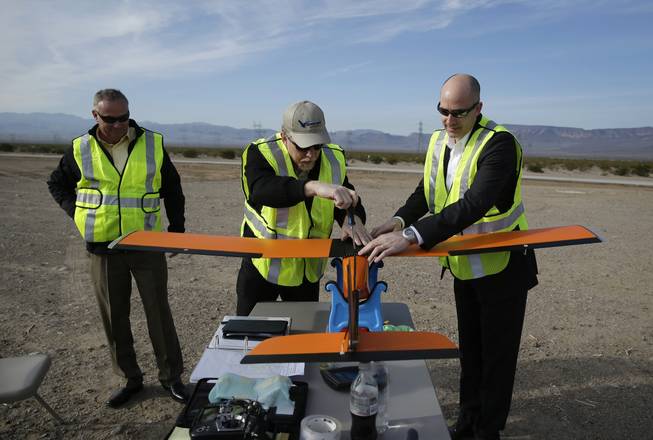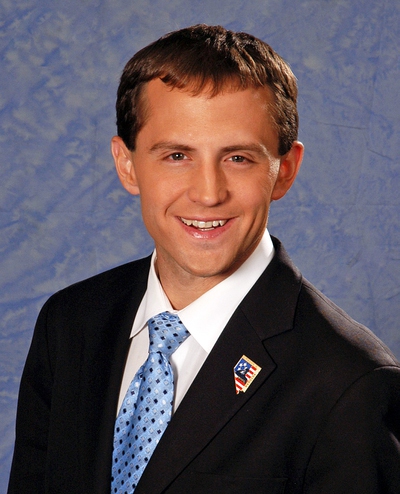
John Locher / AP
Joe Burns, Scott Carrigan and Dan Johnson of Sensurion Aerospace prepare the Sensurion Aerospace Magpie commercial drone for a flight Friday, Dec. 19, 2014, near Boulder City.
Monday, July 27, 2015 | 2 a.m.
The real-world applications for drones are nearly limitless: Police could use them for search operations; businesses could use them for delivery or marketing.
But unmanned aerial vehicles have critics, too, who worry the technology could undermine civil liberties. Are you protected if a drone peeps through your window? Or if a neighbor flies a drone over your yard?
With such concerns in mind, a number of state legislatures have passed drone-specific laws to protect privacy. Nevada, which hopes a drone test site designation could be an economic booster, is one of them.
The Legislature unanimously approved a bill, effective Oct. 1, that prohibits the weaponization of drones and allows homeowners to file trespass charges involving drones in certain circumstances. It also requires law enforcement to obtain warrants for flying drones in the immediate area of a home, where there is an expectation of privacy.
The Sunday spoke with bill sponsor Assemblyman Elliot Anderson about why he pushed the measure and what it protects.
Where did your interest in unmanned aerial vehicles come from?
Well, we passed a resolution that encouraged the Federal Aviation Administration to create a test site in Nevada, and I realized then we hadn’t really thought about privacy. I decided if we were going to have the UAV industry come to the state, then we should give Nevadans some comfort with the privacy regulation because there really isn’t a lot right now that is suitable for this new technology.
Is this the start of the regulatory process or a final version of what the regulatory structure for UAVs will be?
Right now, I feel like the law is pretty complete. It was fairly comprehensive. We touched a lot of different areas, which is different from many states that just dealt with law enforcement use. It was designed to try to be all encompassing.
The law prohibits drones from being weaponized. Why?
I know there are people who want to develop that. I have seen UAVs equipped with very, very powerful machine guns on YouTube. It can be done. It’s one of those things people think about when they think of UAVs, so I wanted to be able to say, “This isn’t allowed in our state.” That’s another way, I think, to make people more comfortable with the technology.
Does that apply to law enforcement too?
Correct.
Is there a concern police might weaponize UAVs?
No. I don’t think law enforcement is interested in that. I think law enforcement is interested in officer safety during tactical operations.
Some privacy concerns are covered by the Fourth Amendment in terms of what law enforcement can and can’t do with UAVs. What else does the bill provide for regarding privacy protections involving law enforcement?
It provides additional protection for homeowners. Police already need a warrant under the Fourth Amendment if a person has a reasonable expectation of privacy, which is mostly at home. This bill extends it to the curtilage of a residence, which in layman’s terms means your backyard, your front yard, areas that are part and parcel with your home. The reason is, this is a different technology. It can go into tighter spaces. It can go into your backyard, and you might not even know.
What about privacy protections involving people not affiliated with law enforcement — in other words, hobbyists or commercial pilots?
We protected homeowners’ property rights through what is called a trespass cause of action. The bill creates a trespass cause of action if you are flying under 250 feet. We set an artificial height limit to ensure people could have protection but we couldn’t stump the industry because obviously people need to fly over and traverse different areas.
That being said, the cause of action really is focused on your average person who isn’t a professional, who isn’t a business and who potentially could be irresponsible. Businesses are granted immunity from a lawsuit as long as they are in the scope of their business activities.
So let’s say my house was in the middle of an Amazon shipping center’s drone path, and there were constantly Amazon drones flying above my house all day and night. What would be my recourse? There’d be none. We can’t stop commerce. We have to allow the industry to flourish.
This bill is designed to strike a balance between protecting people’s privacy rights and allowing the industry to flourish. We cannot go so far that we stop businesses from utilizing this technology. It only hurts us.


Join the Discussion:
Check this out for a full explanation of our conversion to the LiveFyre commenting system and instructions on how to sign up for an account.
Full comments policy